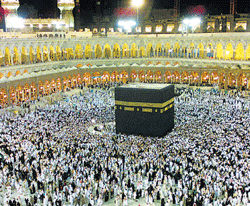
New Delhi, April 17: The Supreme Court on Monday favoured doing away with the practice of sending goodwill delegation to Saudi Arabia during the Haj in a phased manner, saying that the move started in 1967 was no more required in the present scenario.
A bench of justices Aftab Alam and Justice Ranjana Prakash Desa said that the goodwill delegation was required after partition to counter Pakistan and to maintain better relations with the government in Saudi Arabia.
“All that must come to end. You (government) must stop it in 4 or 5 years by reducing the number of people. It was all started in 1967.”
“There is no need to send goodwill delegation,” Justice Alam, speaking for the bench, said.
The court’s response came after Attorney-General G E Vahanvati read out the affidavit filed by the Central government, detailing the draft policy of annual Haj pilgrimage to holy towns of Mecca and Madina for the current year.
The government’s top law officer submitted that the primary purpose of the delegation on government expenditure was to convey goodwill to the government of Saudi Arabia as well as to Indian pilgrims.
“The delegation interacts with the Haj pilgrims from India, understands their issues and takes up the same with the Saudi Arabian authorities. The delegation addresses these issues in their meeting with the minister of Haj, Saudi Arabia and governor of Mecca,” Vahanvati said.
According to the government’s affidavit, the number of delegates was 25 in year 2007, 34 in 2008, 26 in 2009, 30 in 2010 and 27 last year.
The court was hearing a special leave petition filed by the Centre challenging the Bombay High Court’s order which directed it to give allotment of Haj pilgrims to certain Private Tour Operators (PTOs) from government quota in 2011. ?
In conformity with a bilateral agreement signed between India and Saudi Arabia in March this year, a total of 1.70 lakh Muslim pilgrims would be allowed from all over the country.
Of which, 1.25 lakh would be able to visit Saudi Arabia through statutory body Haj Committee of India, Mumbai (HCOI) and remaining 45,000 through private tour operators (PTOs).
The bench fixed April 30 as the next date of hearing in the matter.






Comments
Add new comment